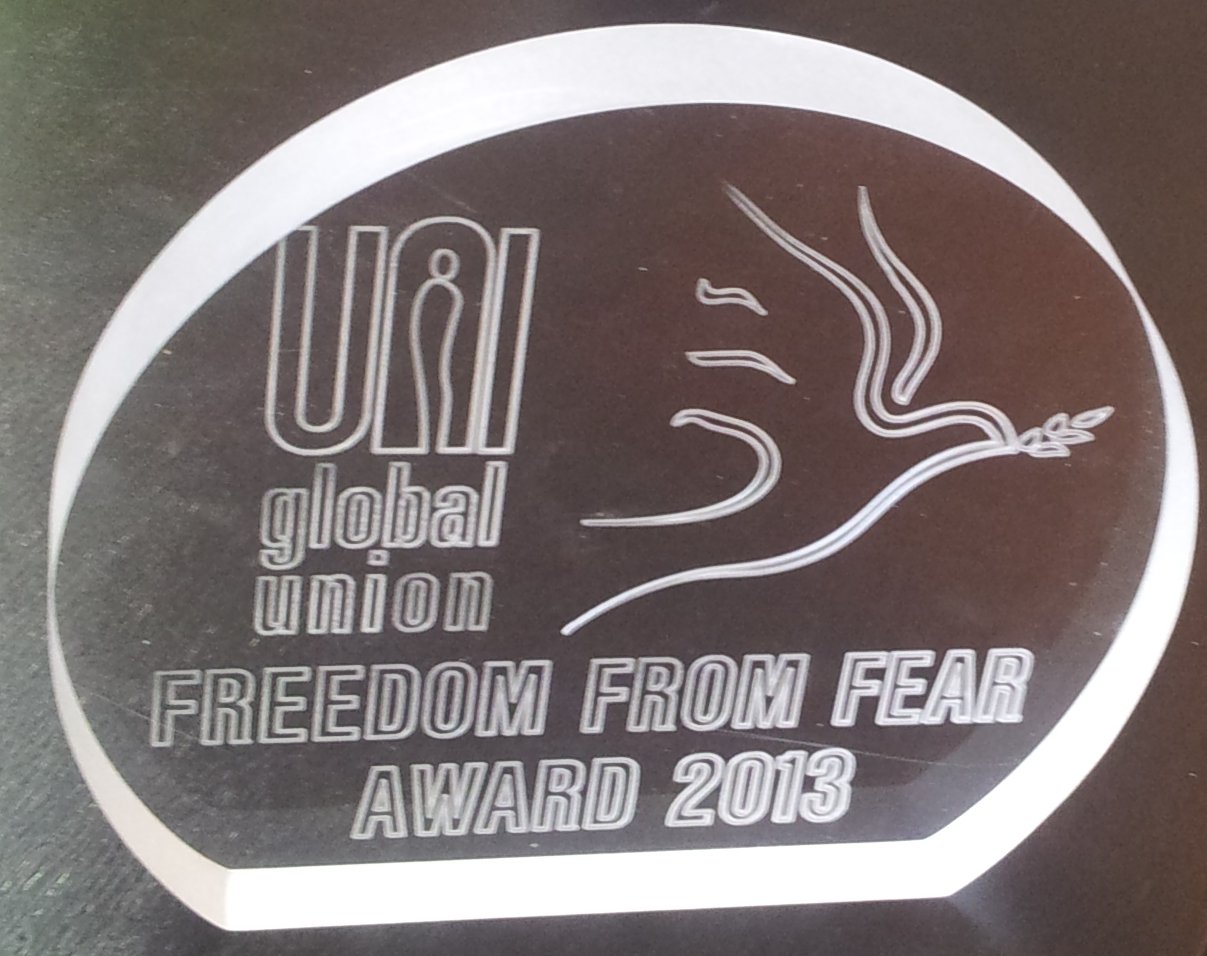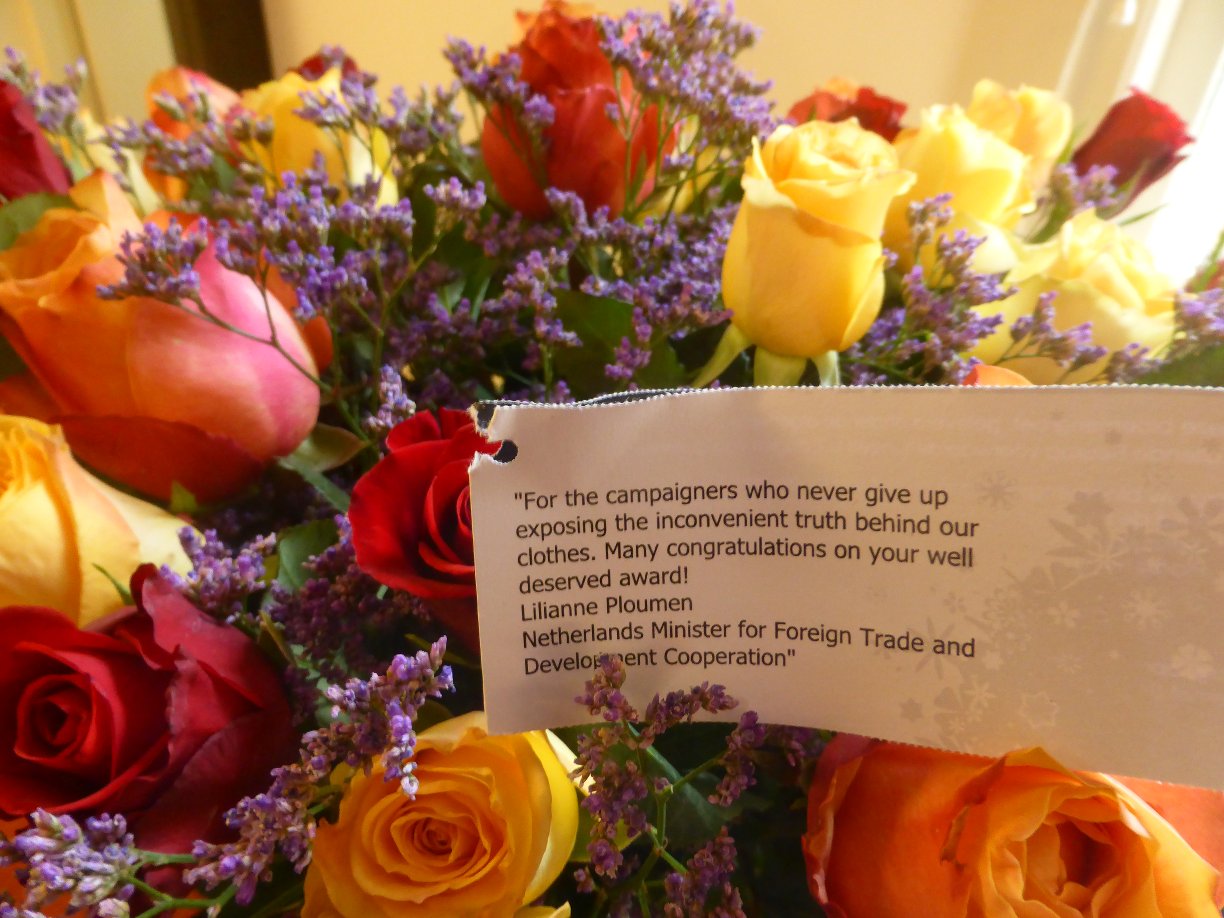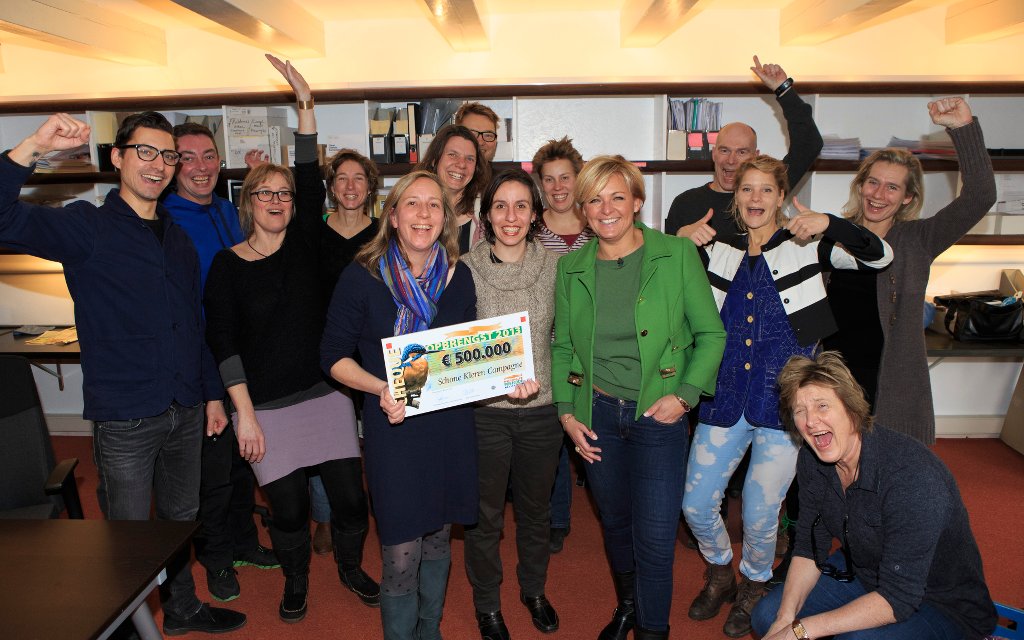Annual Report 2013
Mission
The mission of the Stichting Schone Kleren Campagne (SKC) / Clean Clothes Campaign is to improve the working conditions and support the empowerment of workers in the global garment industry. Our ultimate goal is to end suppression, exploitation and abuse of the (mostly female) workers in the garment sector.
CCC/SKC seeks to achieve these objectives through:
- Supporting workers, trade unions and civil society in countries where garments are produced;
- Pressing companies to assume responsibility and to ensure that their garments are produced under good labour conditions;
- Urging citizens to use their power as consumers. This is done through increasing consumer awareness by providing accurate information about working conditions in the garment industry;
- Making use of existing legal opportunities to improve labour conditions and to lobby for additional legislation that contributes to good labour conditions.
In the 25 years of its existence CCC/SKC has grown in stature and its expertise and motivation are respected by consumers, companies, governments and partners alike. Through the combination of exposing exploitation of workers in the garment industry, opposing the limitation of workers to exercise their rights, and proposing effective and feasible ways forward towards a solution, CCC/SKC has been, and will continue to be, an instrumental actor in the process of empowering workers and improving the working conditions – and the lives – of millions of the mostly women garment workers in the world.
Ineke Zeldenrust with an overview of the eventful year 2013
The Bangladesh Accord
The collapse of the Rana Plaza building in Dhaka on 24 April 2013 cost the lives of 1,138 people and injured over 2,000 more, making it the deadliest garment-factory disaster ever.
The collapse shone a light on the terrible risks garment workers were facing just by going to work. The impact of the collapse and the global attention led to over 160 brands signing a groundbreaking initiative the Bangladesh Fire and Building Safety Accord. Clean Clothes Campaign alongside other labour rights organisations, was at the forefront of the push to see this Accord become legally binding and continue to play a key role monitoring the implementation of the Accord.
Read more about the Rana Plaza collapse on the Spotlight page with interviews with workers and activists and an interactive timeline marking key events after the collapse and it's global consequences.
Rana Plaza Trust Fund
In September 2013 the Rana Plaza Coordination Committee was established, consisting of representatives of the Bangladeshi government, local and international trade unions, non-governmental organisations and the International Labour Organisation (ILO) as neutral chair. The committee worked to set up a process to ensure all families of the victims and the survivors received full and fair compensation, resulting in the Rana Plaza Arrangement.
The Arrangement set up the Rana Plaza Donor Trust Fund to collect the necessary money to deliver financial support for loss of income and medical expenses for the Rana Plaza families and survivors by donations from global brands. An estimated US $40 million is needed to deliver the necessary support. At the time of writing the amount collected so far is just over US $17 million.
Pay Up!
Living Wage campaign
Clean Clothes Campaign believes that a living wage is the cornerstone of decent working conditions. Without paying workers enough to afford the basic necessities in life it is impossible for businesses to claim they are working in a sustainable or ethical manner.
2013 saw CCC scale up our work on living wages bringing together 15 European partners and the Asian Floor Wage Alliance in a global campaign that has seen awareness raising activities, research, training of workers and their representatives and lobbying relevant stakeholders and institutions.
Living Wage campaigning in action
On Labour day - May 1 workers and campaigners across Asia took to the streets calling for a living wage as part of the traditional labour day celebrations. In six Asian countries, more than 60.000 workers participated in actions.
In October, CCC partners launched the campaign across high streets and shopping centres in 15 European countries challenging consumers to take action and join workers in the call for a living wage. More than 50,000 people signed the living wage petition, as well as participating in activities, workshops and events.
There is still much to be done, a recent minimum wage raise in Bangladesh falls a long way short of a living wage, and companies like H&M still have a long way to go before their roadmap for a living wage actually becomes a reality for workers. CCC and partners will be building on the campaign over the coming years.
Urgent appeals
An urgent appeal is a rapid response to a request for support from workers in the garment industry whose rights are being infringed. Since the Clean Clothes Campaign (CCC) was launched twenty-five years ago, Clean Clothes activists have supported garment and sportswear workers in almost 450 cases in about 40 different countries where their rights were violated.
Through an urgent appeal, CCC works with and pressures the different parties involved. Those are often fashion brands, buying from the factory where worker's rights are violated, or the factory managements, investors, UN bodies and governments. CCC urges them to take positive action and end the labour rights violations. Other activities involve writing letters of solidarity to workers and their organisations, launching global petitions, social media campaigns and street actions. Most of the cases in which CCC takes action are related to violations of core labour standards on freedom of association, the right to organise, collectively bargain, occupational health and safety, payment and contracts and gender discrimination..
CCC’s role is to voice workers' demands, not to negotiate for them!
The Kingsland factory closure
Late 2012 nearly 200 garment workers at the Kingsland factory in Phnom Penh, Cambodia, were deprived of their severance pay after the factory abruptly closed its doors. To prevent the factory's equipment being removed and sold, and assets being stripped, the workers started a 24 hour vigil and protest camp in front of the factory that lasted for months.
CCC supported the workers by calling upon H&M, one of the factories main buyers, to initiate an investigation into the case and the suppliers, to acknowledge and take responsibility for Kingsland employees and workers within the H&M supply chain and to advocate with all relevant parties to ensure full payment in accordance with the Cambodian Labour Law as well as Article 1 of H&M’s Code of Conduct. Then CCC started a public campaign to increase pressure on H&M.
After months of struggle by the workers, and through the support of an extensive international solidarity network, a historic settlement with Walmart and H&M was reached in March 2013. Read more about this case here.
2013 Urgent Appeals
Victories, such as that of Kingsland are not met in all cases. Cases are generally long lasting processes of reconciliation or compensation, and are faced with great resistance by managers and sometimes global brands. The success of a case will depend on the attitude taken by the many different actors involved, and can take from weeks up to years to be resolved. In 2013 the Clean Clothes Campaign worked on 31 cases in eleven countries and addressed via the urgent appeal system 81 companies to urge them to take action in support of garment worker's human rights.
Kingsland factory closure video
Video credit: Heather Stillwell & Oudom Tat. After a long struggle, the workers gained a historic victory.
Public outreach & campaigning
2013 witnessed the worst industrial disasters to ever hit the garment industry, and the aftermath propelled the work of Clean Clothes Campaign into the media spotlight. We were mentioned over 400 times in online media. Printed press and broadcasters covered us too: nine articles appeared in the New York Times, several mentions in Al Jazeera, Suddeutsche Zeitung, Panorama, ARD, The Guardian, and over 200 mentions in other international press.
Campaigning for Clean Clothes Campaign in 2013 was dominated by the events of April 24th – the collapse of Rana Plaza.
In the immediate aftermath of the collapse over 1,2 million people signed a petition for the implementation of the Bangladesh Accord on Fire and Building Safety.
Clean Clothes Campaign and our partners worked hard to turn the public horror at the collapse of the building into public pressure which saw 160 plus companies sign up to the Accord by the end of 2013.
2013 also saw our first annual review of urgent appeal cases we had worked on with the launch of The Facts Behind Fashion. It provided an opportunity to present the real stories within the garment industry worldwide with workers sharing their stories in videos and interviews. The review gives an exclusive insight on how CCC works together with workers, local organisers and trade union leaders to stop violations of workers rights.
Clean Clothes Campaign also held campaigning events across Europe during the Pay a living Wage action week. The CCC members and partners organised different events, and all were brought together under the joint logo and shared infographics, a central website and a petition calling on brands to pay a living wage were created.
from 1471 to 3574 followers, with a 'jump' of 500 in the days after Rana Plaza
+7000, to a total of 15000
Newsletter: 9433 subscribers
Partner list : 645 subscribers
Recognition and awards
At the end of 2013, Clean Clothes Campaign had the honor of receiving the "Freedom From Fear" award from UNI Global Union.
A kind thank you from minister Lilianne Ploumen, on CCC receiving the 2013 "Freedom From Fear" award:
"For the campaigners who never give up exposing the inconvenient truth behind our clothes.
Many congratulations on your well deserved award!"
Future Structure and Partner Network
Future structure of the CCC Network: developing proposals and consulting the network
As the CCC network approaches 25 years of campaigning on the rights of garment workers worldwide, 2013 saw the network looking forward to how we would continue our work in the future.
Throughout 2013 the Future Structure team worked to consolidate feedback from network partners and associates a consultation process was carried out and a proposal drafted for the Future Structure of the Clean Clothes Campaign.
Amongst others, proposals were made to create national and regional CCC coalitions and offices anywhere in the world, to create a formal strategy development process and put in place decision-making, monitoring and evaluation, conflict resolution and accountability systems. The proposal was circulated to partners, allies and the European CCC for feedback towards the end of 2013.
In 2014, the feedback from this consultation will be incorporated into a new proposal and a plan will be made to begin implementing a new structure for the network.
You can find a selection of our 2013 partners here
Financial overview of CCC/SKC
In 2013 Clean Clothes Campaign/ Schone Kleren Campagne intensified its fund-raising efforts in order to be able to hire extra staff to deal with the increase of work following the Rana Plaza disaster. Two extra short-term subsidies were acquired. One from Oxfam-Novib's 'Women, Peace and Security Fund' and one from the Ministry of Foreign Affairs. The National Postcode Lottery donated € 500.000 from its 2013 proceeds. The work of the Clean Clothes Campaign continued to be supported by the European Commission, through DG Developement and Co-operation - EuropeAid.
Financially CCC/SKC remained a healthy organisation. At the end of the financial year the result was €-10.616 and the assets stand at € 186.299. These assets serve as a continuity reserve, to cover potential financial shortages. The board has fixed the desired continuity reserve at the amount needed to pay staff costs and bureau costs during six months. In 2013 this amount was fixed at € 308.857. Fixing this desired reserve simultaneously creates a ceiling for the reserves.
The costs of raising funds in 2013 (€ 30.866) consisted mainly of staff costs: SKC/CCC raises its funds almost completely by applying for subsidies. The staff time is spent writing the applications.
Expenditures for the objectives in 2013 were 93,5%.
CCC/SKC does not invest its assets in stocks, bonds or other risk-bearing financial instruments. CCC/SKC strives to do its banking in a sustainable and responsible manner. Assets not immediately needed are deposited in its directly accessible ASN savings account.
All of CCC/SKC’s employees receive the same salary, regardless of age, seniority or position within the organisation. The gross monthly salary for all employees in 2013 was € 2.784 for a 36-hour work-week (2012: €2,743).
Recognition of our work: the major charity lottery in the Netherlands supports CCC
Organisational structure
CCC is a network organisation consisting of European network coalitions and a strong international partner network. Currently, there are CCC secretariats in 15 European countries, and in other countries and continents we have strong partners or candidates to become CCC members. Our network members are autonomous organisations, consisting of labour unions and social organisations (women’s organisations, consumer organisations, research institutes, organisations for fair trade, solidarity groups, youth groups, churches, etc).
In total, more than 250 different organisations participate in the campaign.
The CCC International Secretariat shares an office in Amsterdam with the Dutch member Schone Kleren Campagne (SKC) and a common Bureau unit for administrative support for both these secretariats. In 2013 we moved into new premises in the centre of Amsterdam.
The International Secretariat (CCC-IS)
- Coordinates international activities and campaigns.
- Facilitates development of strategy and policy.
- Facilitates the international campaign structures and communication.
- Takes care of publications, renders information accessible to a broad public
- Engages in or commissions research
- Conducts training, capacity building and exchange within the network.
The Dutch Secretariat (SKC)
- SKC aims at awareness building and activating of the Dutch community by presenting information and conducting campaigns.
- In addition, SKC lobbies actively with Dutch garment companies and presents constructive solutions towards implementation of corporately responsible choices in the supply chains of these companies.
- Furthermore, SKC supports workers and their organisations in urgent appeals involving Dutch businesses.
- Finally, SKC urges governmental authorities to implement good legislation and to buy responsibly themselves.
- For more information (in Dutch language), please see www.schonekleren.nl
Organisation team and decision making
SKC/CCC has no director or management team. Since 2011 an ‘Organisation Team’ (OT), consisting of one representative of each of the International Secretariat, the Dutch Secretariat and the Bureau, has been called into existence. All decisions on matters related to working conditions, such as salary or overtime policy, are made by all staff jointly.
The Board
The principles of governance adhered to by SKC/CCC are formulated in the Statutes and Byelaws. The organisation’s board consists of five (volunteer) members.
Composition of the board:
Mr. Evert de Boer (chairman), Mr. Sjef Stoop (treasurer), Ms. Hester Klute (secretary),
Ms. Nina Ascoly, Mr. Just van der Hoeven (members)


